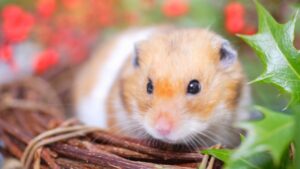
Can You Travel with a Hamster? A Comprehensive Guide
Traveling with a pet hamster isn’t as straightforward as it might seem. It requires careful consideration of your pet’s safety, comfort, and the logistics involved.
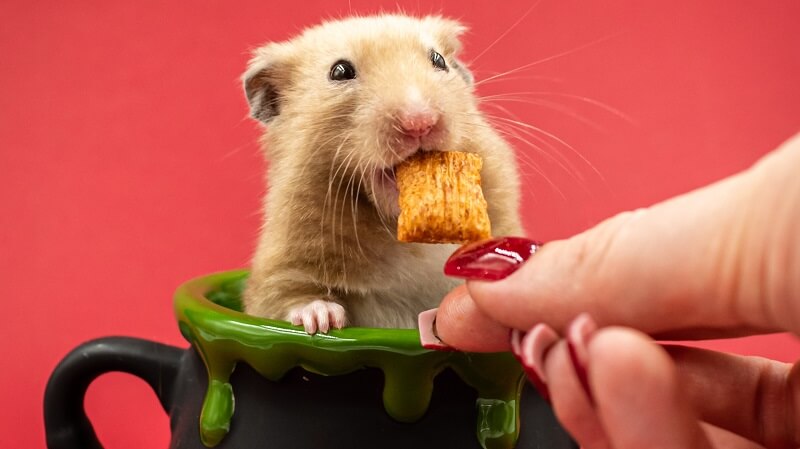
Have you ever found yourself pondering, “How long can a hamster go without food?” Hamsters, those tiny, furry bundles of joy, are delightful companions for many pet owners.
However, to provide them with the best care possible, we must delve into the intricacies of their dietary needs.
In this comprehensive guide, we will not only address the duration a hamster can survive without food but also explore their dietary requirements and the pivotal role of proper care in ensuring their well-being.
Understanding what hamsters eat is essential for their well-being. In this section, we explore their natural dietary habits, the key components of their diet, and how nutrition directly impacts their health.
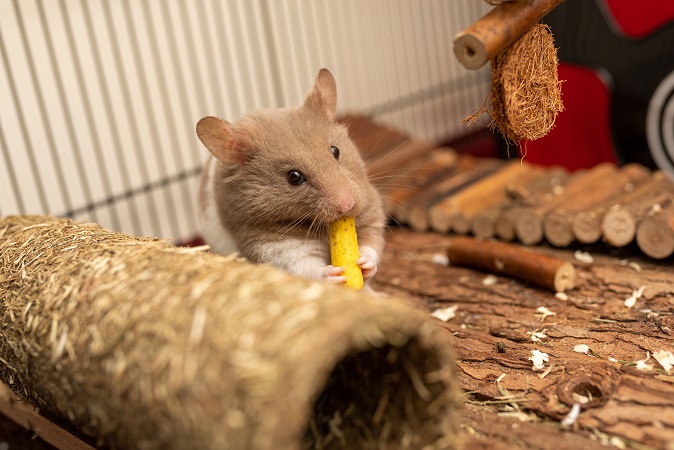
To truly understand a hamster’s dietary needs, let’s delve into their natural eating habits as observed in their wild habitat. In the wild, hamsters are fascinating creatures with primarily omnivorous tendencies.
This means they have a penchant for consuming a diverse range of foods to meet their nutritional requirements.
Their diet, in the wild, is an intriguing mix of seeds, grains, insects, and even the occasional nibble on small plants.
This diversity in their diet is not just a quirk; it’s a survival strategy that provides them with a wide array of essential nutrients.
In the wild, hamsters are skilled foragers, scouring their surroundings for seeds, grains, and insects. They use their cheek pouches to gather and transport these food items to their burrows.
This natural behavior underscores their adaptability and resourcefulness when it comes to finding sustenance.
When we delve into the essential components of a hamster’s diet, we uncover a finely tuned balance of carbohydrates, proteins, and fiber. Each of these components plays a vital role in maintaining the health and well-being of these petite pets.
Carbohydrates, predominantly found in grains and seeds, serve as the primary energy source for hamsters.
These little creatures are incredibly active and need a constant supply of energy to fuel their burrowing, climbing, and exploration activities.
Proteins, on the other hand, are crucial for muscle development and overall health.
Hamsters obtain proteins from a variety of sources, including insects and some plant materials. These proteins aid in growth and repair, ensuring that hamsters remain active and vibrant.
Fiber, derived primarily from plant materials, plays a vital role in hamster digestion.
It not only keeps their gastrointestinal tract functioning smoothly but also helps prevent issues like constipation. Fiber-rich foods are essential to maintaining proper gut health in hamsters.
It’s imperative to grasp the significant impact that a hamster’s diet can have on their overall health and vitality. The importance of providing a well-balanced diet cannot be overstated, as it directly influences their quality of life.
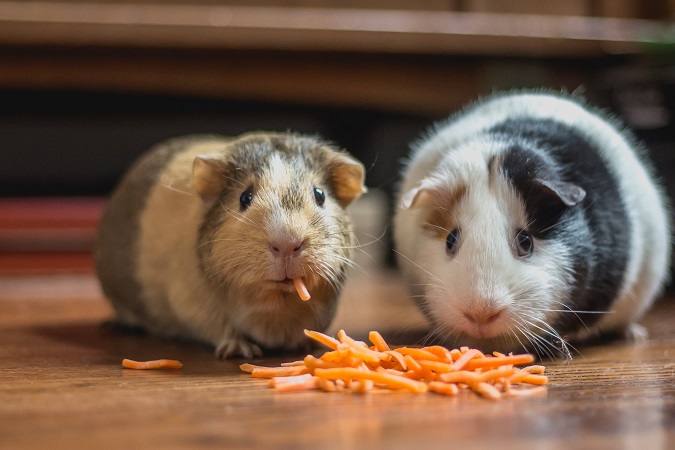
An inadequate or imbalanced diet can lead to a range of health issues.
Obesity is a concern, especially when hamsters are given excessive fatty or sugary treats. Dental problems may arise if their diet lacks items that help wear down their continuously growing teeth.
Gastrointestinal disorders can occur due to a lack of fiber or an unbalanced diet, causing discomfort and distress to these small pets.
Proper nutrition is not just about providing sustenance; it’s about ensuring a hamster’s long-term well-being.
By understanding their dietary needs and offering a diet that mimics their natural eating habits, we can help our hamster companions lead healthier, happier lives.
In this section, we delve into the consequences of hamsters going without food.
Discover how prolonged food deprivation affects their physiology, behavior, and overall health. Understanding these effects is crucial for ensuring the well-being of our furry friends.
Exploring the physiological consequences of prolonged food deprivation sheds light on the serious challenges hamsters face in such situations. One of the most noticeable effects is weight loss, as their bodies begin to utilize stored energy reserves. Energy depletion can lead to weakness, lethargy, and a compromised immune system, making them more susceptible to illnesses.
A lack of food can trigger significant behavioral changes in hamsters. Reduced activity levels and increased lethargy are common responses.
Hamsters may become less active, spend more time in their nests, and show signs of stress or irritability.
Behavioral changes are not only indicative of their discomfort but also a clear signal that immediate attention to their dietary needs is necessary.
Investigating potential health issues that can arise from food deprivation reveals a host of problems.
Digestive problems may emerge as the gastrointestinal system struggles without a regular intake of food. A compromised immune system can result in hamsters falling prey to diseases more easily.
It becomes evident that food deprivation can have far-reaching health consequences.
“How Long Can a Hamster Go Without Food?” explores the duration a hamster can survive without food, emphasizing the importance of regular feeding, the necessity of water during fasting, and the influence of age, health, and environment on their food tolerance.
To determine how long a hamster can endure without food before experiencing severe consequences, it’s essential to consider several factors. While hamsters are known to store food in their cheek pouches and can survive for a brief period without access to food, it is not a sustainable situation. The exact duration varies from hamster to hamster, but it’s crucial to ensure they are provided with regular meals.
Understanding the critical role of providing access to water during fasting periods is equally important. Even when a hamster isn’t eating, they still need water to stay hydrated.
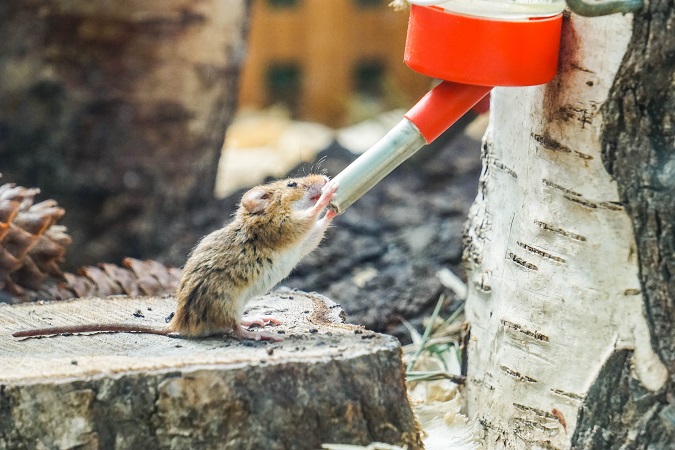
Dehydration can compound the negative effects of food deprivation, so ensuring they have a constant supply of fresh, clean water is essential.
Examining various factors that can influence a hamster’s ability to withstand food deprivation reveals that age, health status, and environmental conditions play significant roles.
Younger hamsters and those with pre-existing health issues may be more vulnerable to the adverse effects of fasting.
Additionally, the temperature and humidity of their environment can impact their tolerance levels.
Coping with a Hamster’s Refusal to Eat” addresses strategies for managing your hamster’s eating habits, highlighting the importance of observing dietary changes, providing proper nutrition, understanding the benefits of a wooden cage, and seeking veterinary advice for health concerns.
Learning how to carefully observe your hamster’s eating habits is essential for early detection of any issues or changes. Keep an eye out for reduced food intake or a complete refusal to eat, as these can be signs of underlying problems.
Discovering the importance of offering appropriate hamster food and maintaining a balanced diet is crucial. Ensure that your hamster’s diet consists of a variety of seeds, grains, and fresh vegetables to meet their nutritional needs.
Recognizing the significance of providing your hamster with a wooden hamster cage becomes apparent, especially during colder seasons. Wooden cages offer excellent insulation, keeping your pet warm and comfortable.
Understanding when it’s necessary to consult a veterinarian if your hamster shows signs of refusing to eat is crucial. Professional guidance can be invaluable in diagnosing and addressing any underlying health issues.
In conclusion, the intriguing question, “How long can a hamster go without food?” highlights the importance of pet owners’ understanding and catering to the dietary needs of these charming companions.
While hamsters can endure a limited period without food, it is our responsibility to ensure that they receive proper nutrition, care, and a comfortable environment, such as a wooden hamster cage.
As responsible pet owners, we should prioritize the health and happiness of these delightful little creatures who bring so much joy into our lives. Remember, a well-fed and contented hamster is a healthy and happy hamster.
FAQ: What are the best types of seeds and grains to include in a hamster’s diet?
Answer: Selecting a variety of seeds and grains, such as sunflower seeds, millet, and oats, ensures a balanced diet for hamsters, providing them with essential nutrients and energy.
FAQ: How can you tell if a hamster is experiencing dental issues due to its diet?
Answer: Symptoms of dental issues in hamsters include difficulty eating, drooling, and overgrown or misaligned teeth. Regularly providing chewable items in their diet can help maintain dental health.
FAQ: What are the signs of dehydration in hamsters, and how can it be prevented?
Answer: Signs of dehydration in hamsters include lethargy, sunken eyes, and dry mucous membranes. Ensuring constant access to clean water and monitoring their water intake can help prevent dehydration.
FAQ: In what ways does a wooden hamster cage contribute to the dietary well-being of a hamster?
Answer: A wooden hamster cage provides a natural environment that can stimulate foraging behavior and encourage physical activity, both of which are crucial for maintaining a hamster’s digestive health and appetite.
Additionally, the breathability of wooden cages ensures a well-ventilated space, promoting a healthy and stimulating environment for the hamster.
FAQ: How frequently should a hamster’s diet be varied to maintain optimal health?
Answer: Regularly varying a hamster’s diet with a mix of seeds, fresh vegetables, and occasional protein sources helps ensure they receive a range of nutrients and prevents dietary boredom.


Traveling with a pet hamster isn’t as straightforward as it might seem. It requires careful consideration of your pet’s safety, comfort, and the logistics involved.
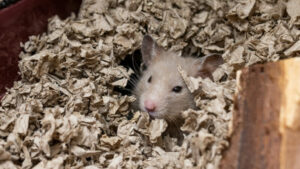
Finding the best hamster cage for Syrian hamster is crucial, as these curious, low-maintenance, and independent pets thrive in the right environment. The primary concern

When I began, the task of selecting essentials for a natural hamster habitat was daunting. To ease this process, I’ve assembled an exclusive set of

Have you ever wondered, “Are hamsters happier in bigger cages?” Generally YES. It’s a question that might seem straightforward, but there’s more to it than
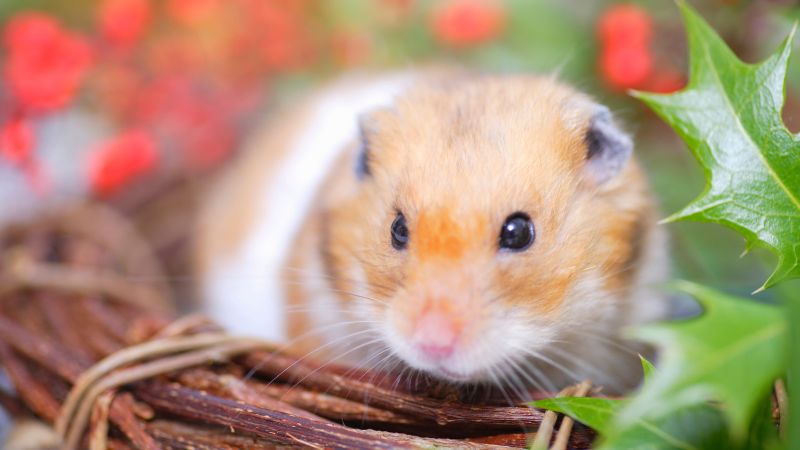
Traveling with a pet hamster isn’t as straightforward as it might seem. It requires careful consideration of your pet’s safety, comfort, and the logistics involved.

Finding the best hamster cage for Syrian hamster is crucial, as these curious, low-maintenance, and independent pets thrive in the right environment. The primary concern

When I began, the task of selecting essentials for a natural hamster habitat was daunting. To ease this process, I’ve assembled an exclusive set of

Have you ever wondered, “Are hamsters happier in bigger cages?” Generally YES. It’s a question that might seem straightforward, but there’s more to it than